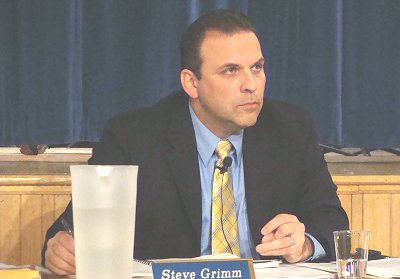- By Dan Veaner
- News
 Print
Print  First the good news: in November the Tompkins County Industrial Development Agency (IDA) came to an agreement in mid-November with the County's largest taxpayer, AES Cayuga, on a 20 year Payment In Lieu Of Taxes (PILOT) agreement. The plant's valuation would increase from $130 million to an anticipated $255 million by 2013. In the first year alone the Lansing School District received $300,000 above what it had gotten the year before. Now the bad news: only three months later the IDA renegotiated with the coal-fueled power plant. The new agreement lowers the assessment from $160 million (which includes a $30 million rise this year as per the original agreement) to $100 million in 2013. That contributed significantly to the school district's budget gap that resulted in cuts and layoffs throughout the district.
First the good news: in November the Tompkins County Industrial Development Agency (IDA) came to an agreement in mid-November with the County's largest taxpayer, AES Cayuga, on a 20 year Payment In Lieu Of Taxes (PILOT) agreement. The plant's valuation would increase from $130 million to an anticipated $255 million by 2013. In the first year alone the Lansing School District received $300,000 above what it had gotten the year before. Now the bad news: only three months later the IDA renegotiated with the coal-fueled power plant. The new agreement lowers the assessment from $160 million (which includes a $30 million rise this year as per the original agreement) to $100 million in 2013. That contributed significantly to the school district's budget gap that resulted in cuts and layoffs throughout the district."The big question is how do you go from $255 million to $100 million in a couple of months?" says Lansing Superintendent Stephen Grimm. "It just did not seem like that was valid, so we're looking to understand how that was calculated."
Grimm vowed to fight back, challenging the formula by which the assessment was arrived at. He was not alone -- county legislators, at least one IDA member, and private citizens also questioned how the new assessment was determined. Mike Coles, a Lansing taxpayer who is a professional appraiser with experience in PILOT agreements and municipal related assessment spoke at several public meetings to try to clarify the process and formula, but not getting answers that satisfied him.

Mike Coles
A week ago Tuesday the contract was reopened again, and Grimm was there with Coles, who the school district has hired as an independent consultant to advise Grimm and his team. Coles' main function is to publicly ask the right questions, and to help district officials understand the process so they can weigh in on the negotiation. Town Councilwoman Kathy Miller plans to attend, and Pat Pryor, Lansing's representative to the County Legislature attended the meeting last week and has said she will attend all the meetings.
"Mike knows the questions to ask," Grimm says. "We're hoping that he'll be breaking our silence. We don't know much about the energy business and how things are valuated. He's able to help us. He's also teaching us. He's asking questions, but he's teaching (Business Administrator Mary June King) and I about the energy business. It's not rocket science. It just takes time to learn, and when you have a good teacher who is knowledgeable it will help us understand. We'll have an educated board as well, and whatever result comes out we will understand it."
PILOT agreements are negotiated between County officials and companies, just as the County is responsible for valuating private property. Taxing authorities such as the school district set the tax levy -- the part paid by property owners, the responsibility for paying the levy is divided among all the property owners in a taxing district based on the value set by the County Assessment Department or that set in a PILOT agreement. With 20% of the school budget coming from AES Cayuga, the impact of the renegotiated contract was a significant blow in a year when state school aid also dropped, and will be more devastating when federal stimulus money disappears in the 2011-2012 budget year.
But while the school district has no legal standing in formulating the agreement, Grimm is hoping that his input and Coles' expertise will influence the negotiation and help County officials to get the best possible deal for taxpayers. The County has elected to stay in-house, assigning Director of Assessment Jay Franklin to conduct the actual assessment of the plant.
"We asked them if they were going to hire someone and they indicated they were not going to go outside their employees ranks," Grimm says. "That's fine. We have our expert who is going to be advising us and who will be looking at our best interests. That is really what I am concerned about."
While developing the budget that voters passed last month for next school year, Grimm noted that the money lost from the renegotiated PILOT is the equivalent of taking 200 homes off the tax roles. There are new developments on the drawing board, but it would be difficult to make up the loss in new building. Realistically if the assessment is further reduced new development couldn't hope to keep up.
Grimm says he hopes a recovering economy will bring back some revenue from the PILOT, and noted that during the school budget hearing community member Jim Eyster had read a report from the company's CEO that lauded an upturn in revenue.
"Hopefully AES Cayuga as a global company improves along with the economy, and we're starting to see some economic improvement, that should mean that they're going to have favorable profits," Grimm says. "Obviously I want to reverse the PILOT and have it go back to what it was before. But at this point just stopping the bleeding is the most important triage."
Grimm says that before moving to Lansing from Rochester he witnessed Xerox and Kodak struggling to remain viable as the technologies they excelled at quickly became obsolete. He notes that the AES Cayuga plant is coal-fueled, but says that if the management is forward-looking they will take a proactive approach to transform the plant to take advantage of new technologies.

Superintendent Stephen Grimm
"We can see other businesses make those kinds of changes ahead of the curve and then they can actually be a leader in the next level," Grimm notes. "They are energy experts and they are able to produce electric power whether it comes from coal fired plants or some other source. It is possible they could transform their company into something that is still a thriving business.
"But if that doesn't happen the things that we're in control of are creating and maintaining a great school system that helps make the area attractive so that people want to move here and live here. Even better would be working here. Maybe businesses will find Lansing an attractive area to bring their business. In this area we have many small startups that bring in millions of dollars of revenue. We have a lot of areas in Lansing where we can support that."
Grimm has joined the Town of Lansing's Economic Development Committee to help try to steer just that kind of development. Business growth takes the tax pressure off of homeowners, who are 'taxed to the max' right now. He hopes to help create an environment in the town that attracts new business, creates new jobs, and spurs development that will make the school district less reliant on the AES Cayuga assessment.
"It just takes a few things happening like that," Grimm says. "We saw that with the Extramart. It's just exploding (with business). And it's bringing people here, and it's probably augmenting some of the other businesses."
Meanwhile he plans to be at every IDA meeting at which the new negotiation is discussed. Both Grimm and Coles have said that the lower assessment may be right -- that with the information they had they just didn't know. But both have been deeply skeptical that an assessment of $255 million could drop to $100 million in only a few months.
"The idea is that people get educated about what's happening in the energy business," Grimm says. "Then there will be discussion about how the value is determined. Then there will be an agreement on what the value should be. It is very wise to have Mike Coles on board with us, to feel like we've got some expertise in the room to help us understand what's happening."
----
v6i22



